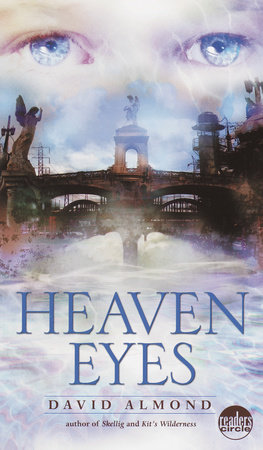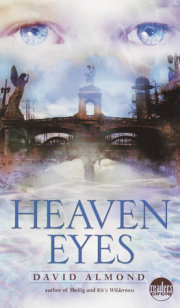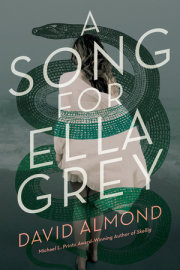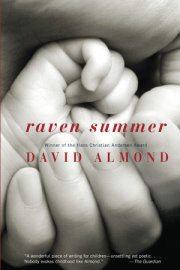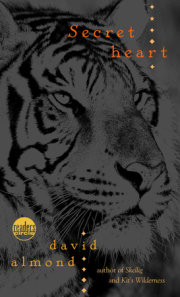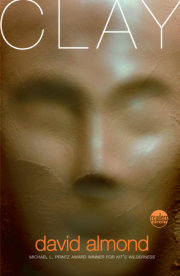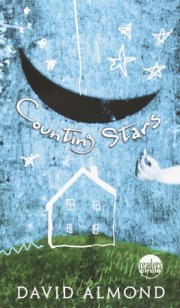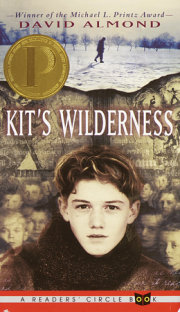The Middle of the World
She started with The Universe. Then she wrote The Galaxy, The Solar System, The Earth, Europe, England, Felling, Our House, The Kitchen, The White Chair With A Hundred Holes Like Stars, then her name, Margaret, and she paused.
"What's in the middle of me?" she asked.
"Your heart," said Mary.
She wrote My Heart.
"In the middle of that?"
"Your soul," said Catherine.
She wrote My Soul.
Mam reached down and lifted the front of Margaret's T-shirt and prodded her navel.
"That's where your middle is," she said. "That's where you were part of me."
Margaret drew a row of stick figures, then drew concentric rings growing out from each of them.
"Where's the real middle of the world?" she said.
"They used to think the Mediterranean," said Catherine. "Medi means middle. Terra means world. The sea at the middle of the world."
Margaret drew a blue sea with a green earth around it.
"There was another sea at the edges," said Catherine. "It was filled with monsters and it went right to the end of the world. If you got that far, you just fell off."
Margaret drew this sea. She put fangs and fins for monsters.
"There's no end, really, is there?" she said.
"No," said Catherine.
"And there's no middle, is there?"
Catherine laughed.
"Not really."
Mam prodded Margaret's navel again.
"That's the middle of the world," she said.
Later that day we went to the grave. Colin rushed home from Reyrolle's on his Vespa for lunch. He bolted his food and rattled away again. We heard the scooter taking him on to Felling Bank and down toward the square.
When it faded, Mary said,
"Should we go to the grave today?"
We hadn't been for months. We thought of the dead being in Heaven rather than being in the earth.
"Good idea," said Mam. "I'll make some bara brith for when you get home."
We were on the rocky path at the foot of the street when Dandy ran after us. He was a little black poodle that was never clipped and had horrible breath.
"Go home!" said Mary. "Dandy, go home!"
He yapped and growled and whined.
"Dandy, go home!"
No good. We just had to let him trot along beside us.
Margaret fiddled with her navel as she walked.
"When I started," she said, "what was I like?"
"What do you think you were like?" said Mary. "Like a gorilla? You were very very very little. You were that little, you couldn't even be seen. You were that little, nobody even knew you were blinkin there!"
"Daft dog," said Catherine, as Dandy ran madly through a clump of foxgloves and jumped at bees.
Soon we saw Auntie Jan and Auntie Mona ahead of us. They wore head scarves and carried shopping bags on their arms.
"Bet you can't tell which is which," said Mary.
"Even when they're talking to me I can't tell which is which," said Margaret.
The two aunts hurried into Ell Dene Crescent.
"Did they look the same when nobody knew they were there?" said Margaret.
"Of course they did!" said Mary. "Everybody looks the same when they can't be blinkin seen!"
The aunts waved and grinned and we all waved and Dandy yapped and then they hurried on again down into Ell Dene Crescent.
Mary picked daisies from the verges as we walked.
She said, "Dad once said that daisies were the best of all flowers. I think I remember that."
"You do," said Catherine. "You do remember. He called them day's eyes. Awake in the day and closed asleep at night."
Further on, Daft Peter lay in his greatcoat under a tree on The Drive.
"Not him!" said Catherine. "We'll never get away from him!"
We sat on a bench on Watermill Lane.
"How far is it?" said Margaret.
"You know how far," said Mary.
"Nowhere's far in Felling," said Catherine.
We watched Daft Peter.
"Move," said Catherine. "Go on. Move."
"Is Felling very small?" said Margaret.
Mary stamped her feet.
"Yes," said Catherine.
"Is it the smallest place in the world?"
"Is this Daft Question Day?" said Mary.
"Yes!" said Margaret.
"It's very small," said Catherine. "But there's smaller places."
"Where?"
"Places in the desert," said Mary. "Rings of huts in the jungle. Villages in the Himalayas."
"Yes," said Catherine. "And places like Hebburn or Seaton Sluice."
"Not Seaton Sluice," said Mary. "It's got that big beach. It's got to be bigger than Felling. And Hebburn's got that big new shopping center."
Catherine sighed.
"Windy Nook, then," she said.
"That's not fair," said Mary. "Windy Nook's a part of somewhere else."
"Where, then? And make it somewhere we know."
"Bill Quay," said Mary.
No one said anything, even though we all knew Bill Quay was part of somewhere else as well.
"Thank goodness," said Catherine. "Bill Quay."
Daft Peter didn't move. In the end, we walked on. Dandy snarled as we drew nearer to the man.
"Dandy!" said Catherine.
Daft Peter smiled and rubbed his eyes.
"Here's me thought I was dreamin," he said. "And all the time I'm just wakin up."
He leaned against the tree.
"What would ye say if I knew how to turn swimmin fish into flyin fowl?" he said.
"Take no notice," whispered Catherine.
"Not much at all, I see," said Peter. "But what if I said I could take you girls and show you how to fly aroond this tree."
"I'd say you couldn't!" said Mary.
"Aha!" said Peter. "Just let me look inside this bag, then."
He dug into a brown bag. He took out a sandwich, something bright red and black hanging out of two dried-out slices of bread. He held it out to Mary as we approached.
"Take a bite of that," he said. "Go on, take a bite of that and see."
Dandy jumped up at him, barking and snarling. Daft Peter flailed and kicked and the sandwich flew into the road.
"Daft dog!" he shouted. "Look what ye've done to me dinna!"
We hurried past.
"What would ye say if I turned a daft dog into a nice meat pie?" yelled Peter.
"I'd say it would be very hairy and it would stink!" said Mary.
Copyright © 2001 by David Almond. All rights reserved. No part of this excerpt may be reproduced or reprinted without permission in writing from the publisher.

